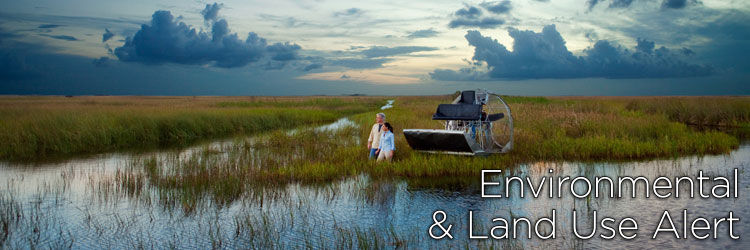
The Florida Department of Environmental Protection (FDEP) is close to assuming responsibility for federal wetlands permitting within the state, a change that will radically overhaul permitting for major land projects in the state.
Currently, anyone seeking to dredge or fill a wetland must obtain two permits — one permit from FDEP and another permit from the United States Army Corps of Engineers (Corps). Florida and the United States have their own definition of what constitutes a wetland that requires a permit to dredge or fill and although theoretical differences exist between the definitions, in actual practice the wetlands requiring a permit to dredge or fill are nearly identical. For many years, property owners seeking to alter their wetlands have complained about the amount of time it requires to obtain a wetlands permit — known by the section of the Clean Water Act requiring a permit as a “404” permit — from the Corps. By contrast, FDEP wetland permits — known by the acronym for Environmental Resource Permit (ERP) — have been quicker to obtain. In an apparent attempt to streamline the process, FDEP has been laying the groundwork to apply to the United States Environmental Protection Agency (EPA) to assume the 404 permit program under provisions of the Clean Water Act that allow for states to do so.
During this year’s legislative session, FDEP received approval from the Florida Legislature to pursue delegation of the federal 404 permitting authority. FDEP and EPA also agreed on a Memorandum of Agreement (MOA) that spells out each agencies responsibility if Florida assumes the 404 Permit program. FDEP is currently pursuing a similar MOA with the Corps and the United States Fish and Wildlife Service (USFWS), both of whom would see changes to their role in the 404 permit program.
Collectively, these changes are very significant for those developing property, expanding (or resuming) agricultural use of land, mining, or engaging in silviculture. Most regulated interests seem to agree that, on the whole, the elimination of a separate federal permit for essentially similar environmental requirements is a benefit, although some risks remain to be resolved. For example, the Clean Water Act limits state-issued 404 Permits to a five-year duration, unlike those issued by their federal counterparts. For major projects, such as those associated with mining or large-scale development, the potential uncertainty at the end of the five-year period creates a risk for uncompleted projects. Similarly, whether endangered species act review will occur under Section 10 or the relatively faster Section 7, also remain to be resolved. Business groups and environmental groups alike are seeking greater clarity on these issues.
FDEP is nearly done finalizing the rule, in newly created Chapter 62-331 of the Florida Administrative Code. Comments on the new rule are being accepted until July 31, 2018. Once finalized, barring any administrative legal challenges, FDEP is expected to finalize MOAs with the Corps and USFWS before submitting the application seeking delegation of the program to EPA for review, public comment, and approval. If EPA approves, it will publish a notice in the federal register announcing the approval and setting a date for the transition.
Some clouds are on the horizon, as environmental groups voice concern about not wishing to wait until the EPA public comment period commences to see the final MOAs. Timing is also a question mark. The Trump administration is expected to remain receptive even after Administrator Pruitt’s departure, but any delay in rule development could allow a subsequent state administration to alter course in early 2019 depending on the outcome of results in the November state elections. Challenges negotiating MOAs with the federal government could cause a delay, and recent aborted rulemaking by a Corps Florida office suggests less than unanimous support across the Corps. Any litigation challenge by environmental or businesses that isn’t quickly resolved is also a potential timing concern. If everything goes smoothly, however, FDEP hopes to wrap up the assumption process by the end of 2018.
Yes! Please sign me up to receive email alerts from other Gunster practice areas.
This publication is for general information only. It is not legal advice, and legal counsel should be contacted before any action is taken that might be influenced by this publication.
About Gunster
Gunster, Florida’s law firm for business, provides full-service legal counsel to leading organizations and individuals from its 13 offices statewide. Established in 1925, the firm has expanded, diversified and evolved, but always with a singular focus: Florida and its clients’ stake in it. A magnet for business-savvy attorneys who embrace collaboration for the greatest advantage of clients, Gunster’s growth has not been at the expense of personalized service but because of it. The firm serves clients from its offices in Boca Raton, Fort Lauderdale, Jacksonville, Miami, Naples, Orlando, Palm Beach, Stuart, Tallahassee, Tampa Bayshore, Tampa Downtown, Vero Beach, and its headquarters in West Palm Beach. With more than 280 attorneys and consultants, and over 290 committed professional staff, Gunster is ranked among the National Law Journal’s list of the 500 largest law firms and has been recognized as one of the Top 100 Diverse Law Firms by Law360. More information about its practice areas, offices and insider’s view newsletters is available at www.gunster.com.
